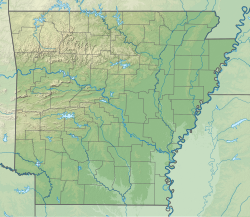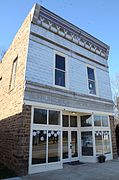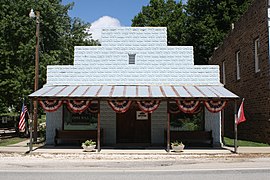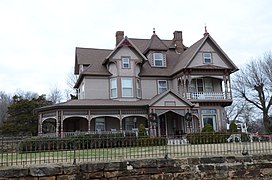Canehill, Arkansas
Canehill, Arkansas | |
|---|---|
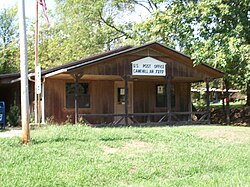 Main façade of the Canehill Post Office | |
| Coordinates: 35°54′50″N 94°23′51″W / 35.91389°N 94.39750°W | |
| Country | |
| State | |
| County | Washington |
| Township | Cane Hill |
| Founded | 1839 |
| Elevation | 423 m (1,388 ft) |
| Population (2020) | |
| • Total | 74 |
| Time zone | UTC-6 (Central (CST)) |
| • Summer (DST) | UTC-5 (CDT) |
| Zip code | 72717 |
| Area code | 479 |
| GNIS feature ID | 2805630[1] |
| Website | historiccanehillar |
Canehill, also known as Cane Hill and Boonsboro, is an unincorporated community and census-designated place (CDP) in Washington County, Arkansas, United States. It was first listed as a CDP in the 2020 census with a population of 74.[2]
The community is located in the Ozark Mountains on the outskirts of the Northwest Arkansas metropolitan area. One of the most historic communities in the state, Canehill contains seventeen listings on the National Register of Historic Places (NRHP). The Cane Hill College began operations in 1834, which led to the rapid growth and development of the community as a center of higher education. The college and community suffered during the American Civil War, and was bypassed by the railroad, which chose a route through Lincoln. Recently, restoration and preservation of many historic buildings has been undertaken by a nonprofit organization, Historic Cane Hill Inc.
Geography
[edit]The post office at Canehill is 1322 feet above sea level.[3] Canehill is on Arkansas Highway 45, approximately 25 miles (40 km) southwest of Fayetteville and 6 miles (9.7 km) east of the Oklahoma border. Considered a postal designation (ZIP code 72717), the population of the ZCTA was 847[4] at the 2000 census.
History
[edit]In 1834, the Cumberland Presbyterians established the first collegiate learning institute in Arkansas, naming it the Cane Hill School, after a nearby geological feature.[5] The current Post Office was opened in 1839 and was originally unnamed. In 1843, it was named Boonsboro, and the town maintained this name throughout the American Civil War. The year of 1862 brought the Battle of Cane Hill.

In 1897, the Cumberland Presbyterian Church considered Cane Hill College[6] as the starting point for their "state" college. However, due to the nearby competition from Arkansas Industrial University, the decline of Cane Hill as a population center and its remote location, the Synod decided to open Arkansas Cumberland College[7] in Clarksville, Arkansas, a more centralized location. In 1891, Cane Hill College closed its doors permanently. In 1901, the community's name was changed to the current usage, that of Canehill.[3]
Economy
[edit]Early settlers were attracted to the area by natural springs, which were used in agricultural operations. The community served as a trading post and regional center for apple orchards to sell crops to merchants from Fort Smith. The locals also produced and sold sorghum, a tradition continuing today at the annual harvest festival.
Education
[edit]The community is served by the Lincoln Consolidated School District.[8] Lincoln High School is its sole high school.
Demographics
[edit]| Census | Pop. | Note | %± |
|---|---|---|---|
| 2020 | 74 | — | |
| U.S. Decennial Census[9] 2020[10] | |||
2020 census
[edit]| Race / Ethnicity (NH = Non-Hispanic) | Pop 2020[10] | % 2020 |
|---|---|---|
| White alone (NH) | 50 | 67.57% |
| Black or African American alone (NH) | 0 | 0.00% |
| Native American or Alaska Native alone (NH) | 1 | 1.35% |
| Asian alone (NH) | 0 | 0.00% |
| Pacific Islander alone (NH) | 1 | 1.35% |
| Some Other Race alone (NH) | 3 | 4.05% |
| Mixed Race or Multi-Racial (NH) | 15 | 20.27% |
| Hispanic or Latino (any race) | 4 | 5.41% |
| Total | 74 | 100.00% |
Transportation
[edit]As of 2023, there is no fixed route transit service in Canehill. Ozark Regional Transit operates demand-response service in the area.[11] The nearest intercity bus service is provided by Jefferson Lines in Fayetteville.[12]
Gallery
[edit]-
Cane Hill Museum
-
Harvest Festival Sign
-
Streetside in Cane Hill
References
[edit]- ^ a b U.S. Geological Survey Geographic Names Information System: Canehill, Arkansas
- ^ "Canehill CDP, Arkansas". United States Census Bureau. Retrieved April 7, 2022.
- ^ a b U.S. Geological Survey Geographic Names Information System: Canehill, Arkansas Canehill post office
- ^ U.S. Census Bureau U.S. Census website Fact Sheet for ZCTA 72717
- ^ "About Ozarks - Cane Hill School". Archived from the original on July 12, 2010. Retrieved July 8, 2007.
- ^ "About Ozarks - Cane Hill College". Archived from the original on July 12, 2010. Retrieved January 10, 2011.
- ^ "About Ozarks - Arkansas Cumberland College". Archived from the original on September 21, 2010. Retrieved January 10, 2011.
- ^ "About". Lincoln Consolidated School District. Archived from the original on January 23, 2022. Retrieved August 29, 2019.
- ^ "Decennial Census of Population and Housing by Decades". US Census Bureau.
- ^ a b "P2 Hispanic or Latino, and Not Hispanic or Latino by Race – 2020: DEC Redistricting Data (PL 94-171) – Canehill CDP, Arkansas". United States Census Bureau.
- ^ "Demand Response". Retrieved September 28, 2023.
- ^ "Arkansas Bus Stops". Retrieved September 28, 2023.
External links
[edit]- Official website

- Historic Cane Hill at the Arkansas Archeological Survey
- Historic Cane Hill, Arkansas on YouTube
- Historic Cane Hill Museum at the Arkansas Department of Parks, Heritage, and Tourism
 Media related to Canehill, Arkansas at Wikimedia Commons
Media related to Canehill, Arkansas at Wikimedia Commons

